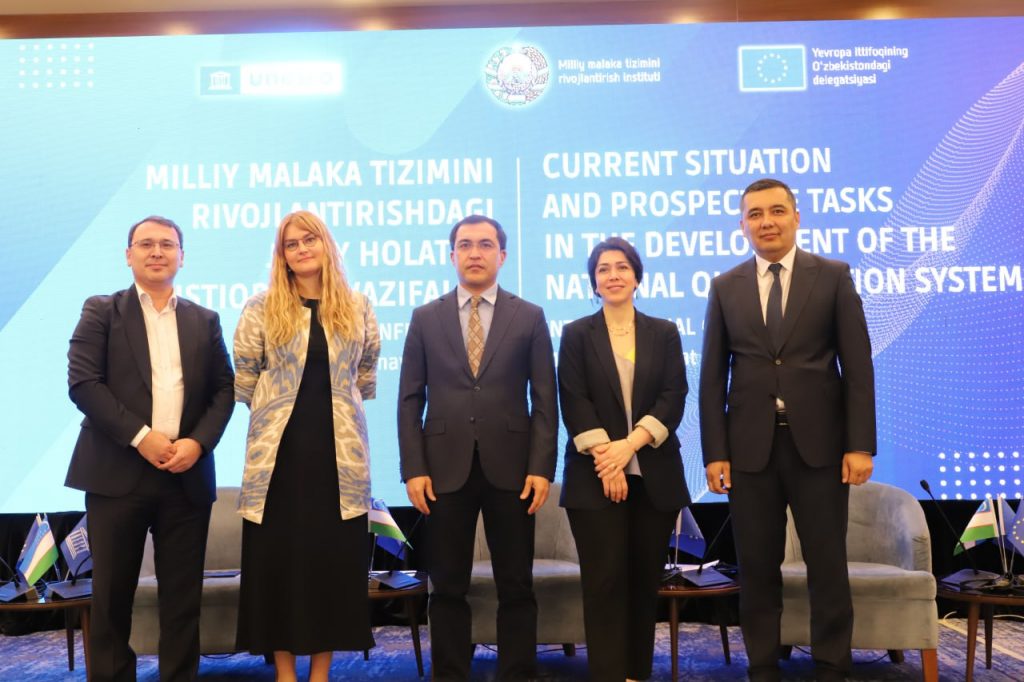On May 22 of this year, the First International Scientific and Practical Conference titled “CURRENT SITUATION AND PROSPECTIVE TASKS IN THE DEVELOPMENT OF THE NATIONAL QUALIFICATION SYSTEM” was held. The event was organized by the Institute for the Development of the National Qualifications System under the National Agency for Quality Assurance in Education, in cooperation with UNESCO and the Delegation of the European Union to Uzbekistan. The conference brought together international experts, representatives of Sectoral Councils, key officials engaged in the development of the national qualifications system, and members of the mass media. The slogan of the conference clearly reflected its core concept: “Lifelong learning as the foundation of the national qualifications system.” This international event emphasized a broad and inclusive approach aimed at fostering continuous personal development through lifelong education and qualifications. Highly qualified experts from international organizations such as UNESCO, Helvetas, GIZ, ETF, DVV International, KOICA, the Asian Development Bank, and the World Bank participated in the large-scale scientific and practical forum.
The official opening ceremony featured speeches by: Mr. Adham Khudaykulov, Director of the National Agency for Quality Assurance in Education under the Administration of the President of the Republic of Uzbekistan; Mr. Kongratbay Sharipov, Minister of Higher Education, Science and Innovation; Ms.Jana Kurpisa, Programme Manager of the Cooperation Section of the EU Delegation to Uzbekistan; Ms.Sara Noshadi, Head of the UNESCO Office in Uzbekistan. In their remarks, the speakers addressed pressing topics on the agenda, including an analysis of the current labor market situation, its interpretation, and the exchange of international experience.
The conference program included presentations by leading national and international experts:
– Anvar Allabergenov, Director of the Institute for the Development of the National Qualifications System, presented a report on: “The Current State and Prospects for the Development of the National Qualifications System in Uzbekistan”;
– Jean-Marc Castejon, UNESCO expert, delivered a presentation on: “Quality Assurance for Qualification System Built on Lifelong Learning Perspectives”;
– Natalia Grekova, GIZ (Germany) expert, presented on: “German Experience in the Recognition of Prior Learning”;
– Michelle Augustine Palayil, ETH Zurich (Switzerland) expert, introduced the topic: “Swiss National Qualification Framework”;
– Nadezhda Solodyankina, representative of the European Training Foundation (ETF), spoke on: “European Recommendations on the Validation of Non-formal and Informal Learning”. The speakers emphasized the importance of a scientifically grounded approach to building a fully functional national qualifications system in the context of globalization, while highlighting the need to strengthen its legal, institutional, and methodological foundations.
Furthermore, the conference featured concrete recommendations and innovative solutions on quality assurance mechanisms; identifying emerging labor market trends; skills forecasting; the application of digital technologies; education and social inclusion of older adults;
Recognition of learning outcomes obtained through various forms of education (formal, non-formal, and informal), using international tools and methodologies.
Throughout the presentations, participants reaffirmed the strategic importance of enhancing the national qualifications system as a key tool for promoting sustainable development, employment, improved education quality, and labor force competitiveness.
In the afternoon, the conference continued with thematic working sessions on the following topics:
- Lifelong learning as the foundation of the national qualifications system.
- National and international trends in quality assurance within the qualification’s framework.
- Enhancing legal and institutional frameworks for the development of the national qualifications system.
- Capacity building of stakeholders involved in the national qualifications system.
As a result of the scientific discussions, the following conclusions were formulated:
– a strong commitment to the concept of lifelong learning was confirmed, including the development of flexible mechanisms, improved accessibility of education pathways, and support for adult education and reskilling;
– the need for active participation in international initiatives was emphasized, along with the adaptation of national qualifications frameworks to international standards and the development of mechanisms for transnational recognition and mutual qualification alignment;
– the implementation of Recognition of Prior Learning (RPL) mechanisms was supported, requiring the development of regulatory frameworks, methodological guidelines, and transparent procedures for assessing and validating non-formal and informal learning outcomes;
– a commitment was made to strengthen the institutional and regulatory foundations of the national qualifications system, develop coordinating structures, enhance their analytical and management capacities, and establish an effective cooperation model among all relevant stakeholders;
– the crucial role of the private sector and employers was acknowledged as key contributors to the development of the qualifications system, particularly in the development of occupational standards, assessment procedures, and labor market-oriented educational programs;
– the need to actively implement innovative and digital solutions in assessment and education processes was underscored, including digital platforms, e-portfolios, remote testing systems, and AI-powered tools to enhance the efficiency, transparency, and accessibility of educational and qualification processes.
The participants expressed their readiness to continue cooperation in the further development and improvement of the National Qualifications System and to strengthen partnerships at the national, regional, and international levels.
This international conference served as a significant platform for advancing the national qualifications system, sharing global expertise, harmonizing with international standards, and enhancing the human capital of Uzbekistan.
![]()

